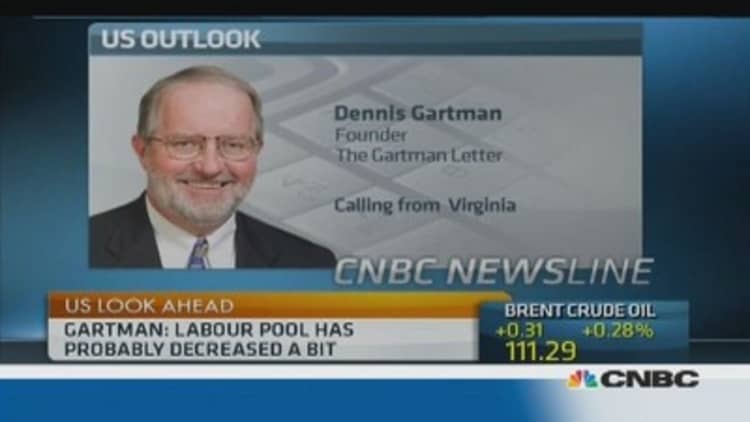
The closely watched jobs figure out on Friday could add some spice to a debate over income inequality in the United States that is becoming increasingly heated, with calls for a rise to the minimum wage growing stronger.
Influential investor Dennis Gartman was the latest commentator to leap into the debate over low wages, telling CNBC there are "very few people living on bread lines in the U.S." and that raising the current level of the minimum wage "would be a very bad decision."
Thousands of low paid service sector employees would beg to differ, however, as many went on strike on Thursday to demand a "living wage." Strikes were held by fast food workers in 100 cities across the U.S. on Thursday with labor union movements calling for a hike to the federal minimum wage of $7.25 an hour (which equates to a salary of roughly $15,000 a year) to $15.00 an hour.
(Read more: Hunger strike? US fast food workers set to walk out)
For his part, President Barack Obama called the debate the "defining challenge of our time" and supported a Senate initiative to raise the minimum pay to $10.05 per hour.
The founder of the closely-watched "Gartman Letter" brushed aside the arguments, telling CNBC Europe's "Squawk Box" on Friday: "Please, please, please -- there are very few people living on the bread line in the States."
"I think it would be a very bad decision if we raise the minimum wage- all it will end up doing is it will put a lot of young black workers out of work. But that's going to happen, that's what we'll do, we'll do the wrong thing. Yes, there has been a widening spread between the middle class and the so-called one percent [the top one percent of earners in the U.S.] but bread lines? I think not."
(Read More: Is the 'American Dream' in danger?)
Gartman said his travels around the U.S. had shown him a very different picture of economic recovery in the U.S. "The hotels are all busy, the cabs are all busy, the shops are all busy and you cannot find a seat on an airplane these days...Bread lines? I think not," he insisted.
"I understand with the inflation we've had over the past couple of years that maybe the minimum wage should go up, but are there very many people who actually live their life and support a family on the minimum wage? No, predominantly it's high school kids putting their feet on the first rung [of the employment ladder]."
His comments come ahead of the widely-watched Friday nonfarm payrolls report. Economists expect to see about 180,000 jobs added in November, off October's 204,000 level, while the unemployment rate is expected to dip to 7.2 percent from 7.3 percent.
Traders, however, are discussing higher whisper numbers well above 200,000 and Gartman joined them in that prediction.
"It's going to be a very good number today, I think it might be a tad higher than 205,000 but we'll always be looking at what has happened to the labor pool which has likely decreased a bit which will likely take the unemployment rate down to 7.2 percent, maybe 7.1 percent."
Such forecasts could weigh on stocks as a strong number would speed up the timetable for the Fed's wind-down of its quantitative easing program. The data today also follow an upbeat private report of U.S. employment this week, which said 215,000 jobs were created during November, above expectations for 173,000.
Gartman was sanguine about the prospect of tapering, however, saying it was not imminent. "The fact is the Fed will look at the numbers when it meets on December 17/18 and unless the number is above 225,000 or 230,000 they're still going to continue with the same level of accommodation," he said.
"There's no reason the Fed will change its policy now that we're down to the last meetings of [Fed chairman] Ben Bernanke before he hands over the reins to Janet Yellen."
- By CNBC's Holly Ellyatt, follow her on Twitter @HollyEllyatt


